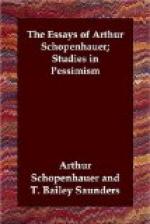However varied the forms that human happiness and misery may take, leading a man to seek the one and shun the other, the material basis of it all is bodily pleasure or bodily pain. This basis is very restricted: it is simply health, food, protection from wet and cold, the satisfaction of the sexual instinct; or else the absence of these things. Consequently, as far as real physical pleasure is concerned, the man is not better off than the brute, except in so far as the higher possibilities of his nervous system make him more sensitive to every kind of pleasure, but also, it must be remembered, to every kind of pain. But then compared with the brute, how much stronger are the passions aroused in him! what an immeasurable difference there is in the depth and vehemence of his emotions!—and yet, in the one case, as in the other, all to produce the same result in the end: namely, health, food, clothing, and so on.
The chief source of all this passion is that thought for what is absent and future, which, with man, exercises such a powerful influence upon all he does. It is this that is the real origin of his cares, his hopes, his fears—emotions which affect him much more deeply than could ever be the case with those present joys and sufferings to which the brute is confined. In his powers of reflection, memory and foresight, man possesses, as it were, a machine for condensing and storing up his pleasures and his sorrows. But the brute has nothing of the kind; whenever it is in pain, it is as though it were suffering for the first time, even though the same thing should have previously happened to it times out of number. It has no power of summing up its feelings. Hence its careless and placid temper: how much it is to be envied! But in man reflection comes in, with all the emotions to which it gives rise; and taking up the same elements of pleasure and pain which are common to him and the brute, it develops his susceptibility to happiness and misery to such a degree that, at one moment the man is brought in an instant to a state of delight that may even prove fatal, at another to the depths of despair and suicide.
If we carry our analysis a step farther, we shall find that, in order to increase his pleasures, man has intentionally added to the number and pressure of his needs, which in their original state were not much more difficult to satisfy than those of the brute. Hence luxury in all its forms; delicate food, the use of tobacco and opium, spirituous liquors, fine clothes, and the thousand and one things than he considers necessary to his existence.




